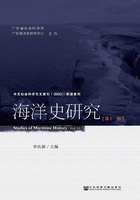
A Study on Anti-mui tsai Movements in Modern Maritime Asia: On the Cases of Modern Guangzhou, Honkong of China and Singapore
Abstract: Mui tsai refers to the Chinese girl who has been transferred to another family with the intention that she would be used as a domestic servant. As Chinese migrants' network expanded, more and more mui tsai went abroad with host, or through marketing, and they became a special vulnerable female group in various Chinese societies in Maritime Asia. In the historical circumstance of social transition, Chinese society and overseas Chinese societies carried out vigorous anti-mui tsai movements in Maritime Asia. Anti-mui tsai movements liberated the oppressed female group and promoted women's self-awakening. In the context of colonialism, anti-mui tsai movements combined gender, class, and even ethnic inequalities, and implied the dynamic game among different interest groups.
Keywords: Maritime Asia; Anti-mui tsai Movement; Mui tsai
(执行编辑:罗燚英)